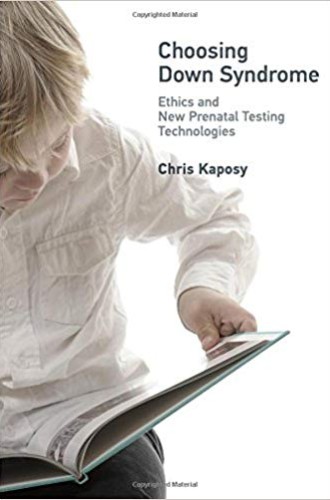Women's rights, disability rights
Abortion, Down syndrome, and the question of prenatal testing
Parents who have a child with Down syndrome and believe in reproductive freedom walk a difficult line. I know this because I’m one of them. We’re committed to protecting legalized abortion while also advocating for unbiased information that might lead fewer women to choose termination after receiving a prenatal diagnosis of Down syndrome. I value women’s rights, but I also value the children who fill our lives with joy and purpose. Even as our society has made great strides to include people with disabilities, prenatal genetic testing is becoming increasingly routine, and abortion is being used to drive a political wedge between disability advocates and advocates of women’s reproductive rights.
Chris Kaposy confronts these dilemmas head on. Identifying as decidedly pro-choice, Kaposy offers a well-informed, thoughtful, and compassionate argument for why prospective parents might not just accept but welcome a child with Down syndrome into their families. Where much of the energy in Down syndrome advocacy has focused on why it is wrong to abort, Kaposy makes the refreshing case that it is a social good to bring people with Down syndrome into the world.
Read our latest issue or browse back issues.
It is reasonable to ask why a book on the ethics of prenatal testing would focus exclusively on Down syndrome. Down syndrome is the most common chromosomal disability, affecting one in every 700 live births in the United States. While often associated with older mothers, babies with Down syndrome are born to women of all ages, and evenly distributed across races and geographic locations. Because of its ubiquity, Down syndrome is on the front lines of debates over abortion and genetic tests that are an increasingly routine part of prenatal care.
At the same time, thanks to improved medical care and social inclusion, people with Down syndrome can expect to lead full and happy lives. This reality raises challenging questions about why we are so eager to detect the condition prenatally and how we act on that information. While Kaposy recognizes what is unique about Down syndrome, he also claims that many aspects of his argument might be applied to other disabilities, particularly those involving cognitive differences.
Kaposy writes from personal experience as the parent of a son with Down syndrome. While some might see his position as hopelessly compromised, Kaposy argues that parents have a privileged understanding of the difficulties and benefits of including a child with Down syndrome in the family. Instead of dismissing them, we should listen to what they have to say.
Kaposy devotes a chapter to exploring the evidence provided in parental memoirs (full disclosure: I am the author of one of them), which he corroborates in the next chapter with quality-of-life studies and other data collected by social scientists. All concur that the challenges of finding adequate health care, education, and behavioral support for a child with Down syndrome are almost always outweighed by the joys and rewards, and that a good deal of the suffering experienced by people with Down syndrome and their families comes from prejudice and exclusion rather than physical or cognitive differences.
Kaposy claims that choosing to raise a child with Down syndrome can be a powerful rejection of the idea that human worth is best gauged by high IQ, a prestigious career, or other standard measures of accomplishment. He asks readers to consider whether they really want to live in a society that equates value with the speed, drive, and productivity prized by capitalism. Instead of seeing people with Down syndrome as burdensome, he invites prospective parents to see them as embodying alternatives to materialistic, achievement-based metrics for determining what counts as a good life. Some might object to the idea that a child could be described as an endorsement or symbol for values. I think Kaposy would argue that the values are already firmly in place; he is calling on readers to act consistently on their claims to recognize “the worth of every human being regardless of ability.”
Kaposy’s critical generosity is striking in today’s combative and polarized political atmosphere. His measured tone is an especially welcome corrective to the nasty and divisive voices that so often dominate debates over abortion. There is no scolding or condemnation here, but rather respectful disagreement with those, like philosophers Peter Singer, Richard Dawkins, Allen Buchanan, Dan W. Brock, Norman Daniels, and Daniel Wikler, who believe people with Down syndrome are less worthy of life, as well as those who consider abortion to be wrong under any circumstances. Kaposy’s objections are all the more compelling for his careful consideration of opposing views.
As much as I welcome this book, I wonder whether its form lessens its potential impact. Kaposy is the first to acknowledge that people with Down syndrome are the target of irrational fear and prejudice. If that’s the case, I’m not convinced that reasoned argument is the best way to combat unacknowledged anxiety. I have no doubt that pastors, philosophers, bioethicists, and other scholarly readers will appreciate Kaposy’s steady reasoning. But parents and prospective parents, whom the book claims as its primary audience, may find its language and methods to be redundant and overly specialized. Take, for example, Kaposy’s account of a hypothetical about abortion and disability, in which “the underlying rational procedures being used in the construction of principle N following from P1 is ‘wide reflective equilibrium.’” The legitimacy this kind of reasoning buys Kaposy with bioethicists may be off-putting to more general readers.
But this potential weakness is also the book’s strength. Choosing Down Syndrome aspires to speak to multiple audiences. It has carefully constructed cases that move from accessible argument to the discipline-specific language of philosophers and bioethicists, evidence that ranges from personal narrative to social scientific data, and refreshing, well-reasoned insights for readers of all stripes.






